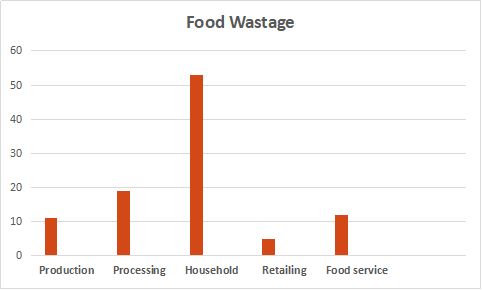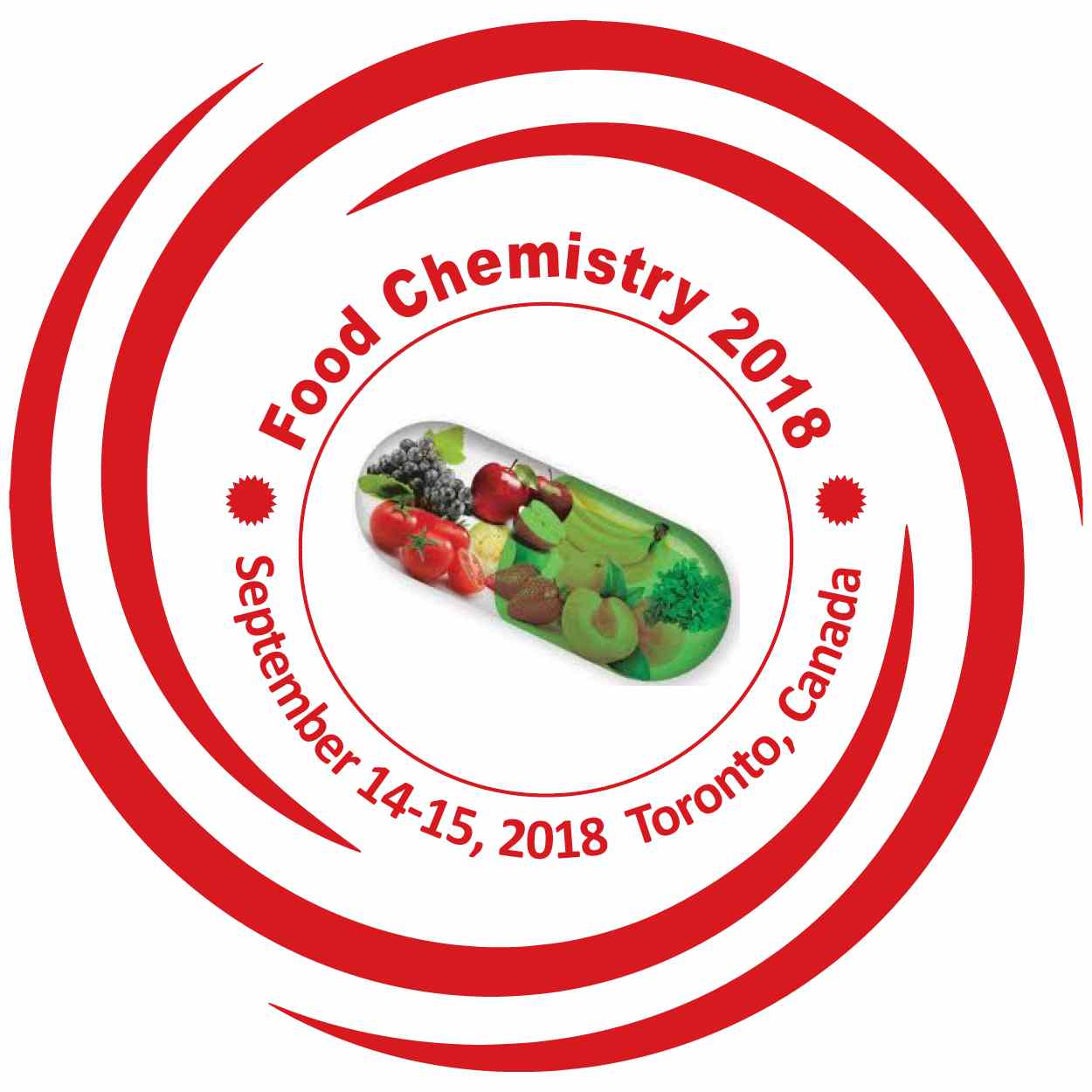Renowned Speakers
We’ve invited the top most influential speakers from around the world to give inspirational talks and lead practical workshops.
Conference Information
About Conference
Food Chemistry 2018 welcomes attendees, presenters, and exhibitors from all over the world to Toronto, Canada. We are delighted to invite you all to attend and register for the “2nd International Congress on Advances in Food Chemistry and Technology” which is going to be held during September 14-15, 2018, Toronto, Canada.
Food Chemistry 2018 has been designed in an interdisciplinary manner with a multitude of tracks to choose from every segment and provides you with a unique opportunity to meet up with peers from both industry and academia and establish a scientific network between them. We cordially invite all concerned people to come join us at our event and make it successful by your participation.
At PULSUS Group, It is our ideology to bring maximum exposure to our attendees, so we make sure the event is a blend which covers professionals such as Food Chemists, dietitians, Food researchers, Industrial professionals from academia &industry making the Food Chemistry 2018 conference a perfect platform.
The conference will be organized around the Theme ‘New Innovative Technology in Food Chemistry’. Our goal is to deliver an outstanding program which covers the entire spectrum of research & innovations in Food Chemistry and Technology and share the cross-cultural experiences of various Food Technological procedures.
Food Chemistry 2018 is an annual meeting of Food Chemistry organizations as well as committees to discuss the future of the Food Chemistry in terms of collaboration, structures and organizational development.
2017 Highlights:
- 200+ Participation (70% Industry: 30% Academia)
- 9+ Keynote Speakers
- 30+ Plenary Speakers
- 3+ Exhibitor
- 14 Innovative Educational Sessions
- B2B Meetings
Why to attend???
With members from around the world focused on learning about Food Chemistry and its advances; this is your best opportunity to reach the largest assemblage of participants from the Food Chemistry community. Conduct presentations, distribute information, meet with current and potential scientists, make a splash with new discoveries in the Food Chemistry and receive name recognition at this 2-day event. World-renowned speakers, the most recent techniques, developments, and the newest updates in Food Biotechnology, Food Processing, Food Safety and Quality Control, Food Waste Management are hallmarks of this conference.
Target Audience:
- Food Researchers
- Healthcare Faculties
- Professors
- Food chemists
- Scientists
- Health care Institutions
- Dietitians
- Food Technologist
- Medical collages
- Industrial Professionals
- Training Institutions
- Business Entrepreneurs
- Directors/Managers/CEO’s
- Presidents & Vice Presidents
- Brand Manufacturers/ Marketers of Consumer Products
- Marketing, Advertising and Promotion Agency Executives
- Educational Institutions
Conference Opportunities
For Researchers and Faculty Members:
- Speaker Presentations
- Poster Display
- Symposium hosting (4-5 member team)
- Workshop organizing
For Universities, Associations & Societies:
- Association Partnering
- Collaboration proposals
- Academic Partnering
- Group Participation
For Students and Research Scholars:
- Poster Competition (Winner will get Best Poster Award)
- Young Researcher Forum (YRF Award to the best presenter)
- Student Attendee
- Group registrations
For Business Delegates:
- Speaker Presentations
- Symposium hosting
- Book Launch event
- Networking opportunities
- Audience participation
For Product Manufacturers:
- Exhibitor and Vendor booths
- Sponsorships opportunities
- Product launch
- Workshop organizing
- Scientific Partnering
- Marketing and Networking with clients
Scientific Sessions
Session 01: Food and Food Chemistry
Food is the substance which is composed of essential nutrients consumed by the living organism for their growth and energy. Food chemistry is the important characteristics of Food science deals with the composition and characteristics of food and includes the chemical changes of food during the processing, storage and utilization. Food chemistry is closely related with the biochemistry, Microbiology, Molecular biology etc. The major aim of food chemistry is to understand and prevent the undesirable changes of food when it exposed to the severe environmental conditions and to improve the nutrients and quality of food. In simple words it is the study of biological and non-biological interactions, metabolism of food and also the food proteins, minerals and vitamins etc
Related Conference:
International conference on Food chemistry and Technology November 05-07, 2018, Berlin, Germany; International conference on Agriculture and Food chemistry July 23-24, 2018, Rome, Italy; International Conference on Food Microbiology and Food Safety July 28-29, 2018, Philadelphia, Usa; Global summit on Food Factor Conference October 04- 05 , 2018, Torremolinos, Spain; International Conference on Food Science, Nutrition & Probiotics August 06-08, 2018, Berlin Germany; International Conference on Food Microbiology November 29-30, 2018, Dublin Irelend; International Conference on Food Processing and Analysis October 11-13, 2018, Moscow, Russia.
Related Societies:
The Gesellschaft Deutscher Chemiker (GDCh) ,American Chemical Society, EuCheMS Division of Food Chemistry , Royal society of chemistry , The Society of Flavor Chemists (SFC) , Division of agricultural and Food Chemistry , ACOS (American Oil Chemists’ society).
Session 02: Technology in Food
Food technology or technology in food is the science that deals with various techniques and methods for processing, preservation, storage etc. The main aspects of food technology are to develop the new and best methods to process and protect the manufactured food products from harmful micro-organisms. The initial scientific research focused on food preservation. This preservation process enhances the flavour, texture, taste and quality of product which results in the efficient and easy marketing of the final food products. In this technique the extra nutrients will be added to the food that is not harmful for the humans and those food will be less open to the severe environmental conditions and from harmful microorganisms. Nowadays new protein food, new methods of food fortification, food adulteration etc are developed to increase the health value.
Related Conferences:
International conference on Agricultural and Food Sciences November 26-28, 2018 Bangkok, Thailand; Congress on Food Science and Human Nutrition September 13-15, 2018, Rome, Italy; International Conference on Agricultural and Food Science October 28-30, 2018 Istanbul, Turkey; International Conference on Food Science and Bio process Technology October 01-03, 2018, Frankfurt, Germany ; International Conference on Nutritional Science and Food Technology July 02-03, 2018, Rome, Italy ; International conference on Food and Beverage packaging July 16-18, 2018, Rome, Italy; International conference on Nutrition, Food Science and technology April 16-17, 2018 Dubai, UAE.
Related societies:
The Chemical Society of Japan (CSJ),Food and Cooking Chemistry, Hungarian chemical society, European Association for Chemical and Molecular Sciences (EuCheMS) ,German Society of Food Chemistry (LChG) ,The Korean Society for Applied Biological Chemistry (KSABC),Society of Nutrition and Food Science.
Session 03: Chemical Additives of Food
Additives is the substance added to the food to increase the flavour, texture, appearance, taste, nutritional value. These additives are also used to inhibit the growth of micro-organisms and increase the shelf life of food products. Additives are from plants or it may be chemically synthesized. Every additive should have the FDA for their regulated use in their industry. Some of the food we eat are fresh. Nowadays some foods may be processed. These processed foods contain small number of additives. What is the need? The foods are subjected to some severe environmental conditions like temperature, oxidation and microbes. These will change the original consumption of food.so the additives are needed to keep food safe from these conditions. Nowadays some additives create some side effects and health risk to the humans that are chemically synthesized due to the customer prospective like yellow dyes, sulfites etc.
Related Conferences:
International conference on Food and Agricultural economics April 27-28 2018, Alanya, Turkey; International congress on Food Technology October 10-12 2018, Cappadocia, Turkey; World Biotechnology Congress July 16-17, 2018, Berlin, Germany; International Conference on Food Quality, Safety and Security October 25-26 2018, Colombo, SriLanka; World Food and Agriculture Conference, June 15-27, 2018, Stockholm, Sweden; World Food Science and Technology Conference June 11-12, 2018, Greece, Europe; World Congress on Food Chemistry and Microbiology September 03-04, 2018, Dubai, UAE.
Related societies:
The European Federation of Food Science and Technology (EFFoST), Nutrition Society of Ethiopia, The Korean Society of Food Science and Technology (KoSFoST), Croatian Society of Biotechnology, Society of Food Hygiene and Technology (SOFHT), American society for Nutrition, Society for international Microbiology and Biotechnology.
Session 04: Nutraceuticals
Nutraceuticals means (nutrients+ pharmaceutical). Nutrient means nourishing food or food component and pharmaceutical means medical drug. Nutraceuticals is the product, or the substance not only used for the diet, it can be used to prevent and treatment of diseases. Nutraceuticals is generally isolated and purified from food and sold in the medicinal forms by the Nutraceutical industries.. These Nutraceuticals can be classified based on the Natural Source, Pharmacological conditions and the Chemical constitutions. Sometimes Nutraceuticals may be interchanged with functional foods the health benefits. Nutraceuticals used in various diseases conditions like Cardiac diseases, Allergy relief, Cancer prevention etc.
Related Conference:
International conference on Food chemistry and Technology November 05-07, 2018, Berlin, Germany; International conference on Agriculture and Food chemistry July 23-24, 2018, Rome, Italy; International Conference on Food Microbiology and Food Safety July 28-29, 2018, Philadelphia, Usa; Global summit on Food Factor Conference October 04- 05 , 2018, Torremolinos, Spain; International Conference on Food Science, Nutrition and Probiotics August 06-08, 2018, Berlin Germany; International Conference on Food Microbiology November 29-30, 2018, Dublin Irelend; International Conference on Food Processing and Analysis October 11-13, 2018, Moscow, Russia.
Related Societies:
The Gesellschaft Deutscher Chemiker (GDCh) ,American Chemical Society, EuCheMS Division of Food Chemistry , Royal society of chemistry , The Society of Flavor Chemists (SFC) , Division of agricultural and Food Chemistry , ACOS (American Oil Chemists’ society).
Session 05: Kinetics of Food Process
Food are generally composed of chemical and biochemical compounds which may exposed each other or to the certain environmental conditions and resulting in the new food compounds. Kinetics means studying the rate of chemical reactions carried out by the some catalyst that take place in food during processing, preservation etc. Some reactions are necessary to produce the compounds with best flavour, texture, taste etc and some may result in harmful substance, spoilage. Chemical reaction occurs when the sufficient energy brought to the molecules and this will produce the collisions that results in breakage and formation of bond in the food molecules. The important thing that studied in kinetics of food process is Water activity, Temperature, concentration etc. Some of the factors affecting the Kinetics of food process is nature of the food, concentration etc.
Related Conferences:
International conference on Agricultural and Food Sciences November 26-28, 2018 Bangkok, Thailand; Congress on Food Science and Human Nutrition September 13-15, 2018, Rome, Italy; International Conference on Agricultural and Food Science October 28-30, 2018 Istanbul,Turkey; International Conference on Food Science and Bio process Technology October 01-03, 2018, Frankfurt, Germany ; International Conference on Nutritional Science and Food Technology July 02-03, 2018, Rome, Italy ; International conference on Food and Beverage packaging July 16-18, 2018, Rome, Italy; International conference on Nutrition, Food Science and technology April 16-17, 2018 Dubai, UAE.
Related societies:
The Chemical Society of Japan (CSJ),Food and Cooking Chemistry, Hungarian chemical society, European Association for Chemical and Molecular Sciences (EuCheMS) ,German Society of Food Chemistry (LChG) ,The Korean Society for Applied Biological Chemistry (KSABC),Society of Nutrition and Food Science.
Session 06: Chemical Composition of Food
Food is the group of edible substance that provide the energy and nutrition by some metabolic pathway. The composition of food means substance which the food is made up of. That is Carbohydrates, Proteins, Vitamins, Minerals, fats and water. Food components are classified as Energy giving Foods that is Carbohydrates and fats, Body Building Foods that is Proteins, Protective Foods are Vitamins and Minerals. If any of these components is reduced in food products and human consumption these will leads to the Deficiency diseases for example Kwashiorkor and Marasmus caused by the deficiency of dietary proteins.
Related Conferences:
International conference on Food and Agricultural economics April 27-28 2018, Alanya, Turkey; International congress on Food Technology October 10-12 2018, Cappadocia, Turkey; World Biotechnology Congress July 16-17, 2018, Berlin, Germany; International Conference on Food Quality, Safety and Security October 25-26 2018, Colombo, SriLanka; World Food and Agriculture Conference, June 15-27, 2018, Stockholm, Sweden; World Food Science and Technology Conference June 11-12, 2018, Greece, Europe; World Congress on Food Chemistry and Microbiology September 03-04, 2018, Dubai, UAE.
Related societies:
The European Federation of Food Science and Technology (EFFoST), Nutrition Society of Ethiopia, The Korean Society of Food Science and Technology (KoSFoST), Croatian Society of Biotechnology, Society of Food Hygiene and Technology (SOFHT), American society for Nutrition, Society for international Microbiology and Biotechnology.
Session 07: Intermediary Metabolism
Intermediary metabolism is defined as the reactions that takes place in every cell of the living beings. It is Catalysed by the Enzymes. These reactions that takes place through the series of pathway called as Metabolic Pathway. Metabolism is divided as (Anabolism and Catabolism). Anabolism means the reaction that build the complex molecule from the simpler ones for example bone growth. Catabolism is referring to the breakdown reaction for energy yielding for example Glycolysis, Citric acid cycle etc. If metabolic pathway is not regulated by the body these will leads to the metabolic disorder example Tyrosinemia.
Related Conference:
International conference on Food chemistry and Technology November 05-07, 2018, Berlin, Germany; International conference on Agriculture and Food chemistry July 23-24, 2018, Rome, Italy; International Conference on Food Microbiology and Food Safety July 28-29, 2018, Philadelphia, Usa; Global summit on Food Factor Conference October 04-05,2018, Torremolinos, Spain; International Conference on Food Science, Nutrition and Probiotics August 06-08, 2018, Berlin Germany; European Food and Beverages Summit March 08-10, 2018, Berlin, Germany; International Conference on Food Processing and Analysis October 11-13, 2018, Moscow, Russia.
Related Societies:
The Gesellschaft Deutscher Chemiker (GDCh) ,American Chemical Society, EuCheMS Division of Food Chemistry , Royal society of chemistry , The Society of Flavor Chemists (SFC) , Division of agricultural and Food Chemistry , ACOS (American Oil Chemists’ society).
Session 08: Food Toxicology
Food toxicology is the study of toxins in the food. That means Food Toxicology deals with the study of substance found in the food that cause adverse effect to the body when it is consumed by the large quantities. Toxins in food may be from natural or it might be a man made that is contaminants while processing the food. Natural toxin present in food by the plant and animals or by the microbes. Natural toxins in plant or animal derived food causes the chronic reaction to the body and food borne diseases. Risk of toxins in the food is carcinogenic, mutagenic, teratogenic etc. Some toxins by the Food Additives, or by the metals.
Related Conferences:
International conference on Agricultural and Food Sciences November 26-28, 2018 Bangkok, Thailand; Congress on Food Science and Human Nutrition September 13-15, 2018, Rome, Italy; International Conference on Agricultural and Food Science October 28-30, 2018 Istanbul,Turkey; International Conference on Food Science and Bio process Technology October 01-03, 2018, Frankfurt, Germany ; International Conference on Nutritional Science and Food Technology July 02-03, 2018, Rome, Italy ; International conference on Food and Beverage packaging July 16-18, 2018, Rome, Italy; International conference on Nutrition, Food Science and technology April 16-17, 2018 Dubai, UAE.
Related societies:
The Chemical Society of Japan (CSJ),Food and Cooking Chemistry, Hungarian chemical society, European Association for Chemical and Molecular Sciences (EuCheMS) ,German Society of Food Chemistry (LChG) ,The Korean Society for Applied Biological Chemistry (KSABC),Society of Nutrition and Food Science.
Session 09: Balanced Diet, Obesity and Cancer
Balanced diet that contains sufficient amount of nutrients and fibres that provides the energy and nutrition to maintain the body cells and for the development and growth of the body. Balanced diet is important for health mind and healthy body. It is also used to maintain the body weight. Not a single food provides all the nutrients sufficient for the body it should contains all the nutrients like carbohydrates, vitamins, minerals, fats etc. Over diet leads to obesity. Obesity is the overweight that means the presence of more fat in the body. The body should have correct Body Mass Index. Some foods like Red Meat, processed foods and salt preserved foods causes cancer to the body.
Related Conferences:
International conference on Food and Agricultural economics April 27-28 2018, Alanya, Turkey; International congress on Food Technology October 10-12 2018, Cappadocia, Turkey; World Biotechnology Congress July 16-17, 2018, Berlin, Germany; International Conference on Food Quality, Safety and Security October 25-26 2018, Colombo, SriLanka; World Food and Agriculture Conference, June 15-27, 2018, Stockholm, Sweden; World Food Science and Technology Conference June 11-12, 2018, Greece, Europe; World Congress on Food Chemistry and Microbiology September 03-04, 2018, Dubai, UAE.
Related societies:
The European Federation of Food Science and Technology (EFFoST), Nutrition Society of Ethiopia, The Korean Society of Food Science and Technology (KoSFoST), Croatian Society of Biotechnology, Society of Food Hygiene and Technology (SOFHT), American society for Nutrition, Society for international Microbiology and Biotechnology.
Session10: Recent Innovation in Food Chemistry
Various new traditional and modern technologies have been developed to produce the efficient nutritious food and food ingredients for the health food formulations. Recent technology in Food chemistry plays the vital role in converting the nutrient information related to the customer demands in food products. To develop the food with high heath value without disturbing their flavour, texture, appearance a wide array food processing and industrial techniques must be employed. Nowadays many successful projects in food recovery have been performed for the cost minimization and development of food products.
Related Conference:
International conference on Food chemistry and Technology November 05-07, 2018, Berlin, Germany; International conference on Agriculture and Food chemistry July 23-24, 2018, Rome, Italy; International Conference on Food Microbiology and Food Safety July 28-29, 2018, Philadelphia, Usa; Global summit on Food Factor Conference October 04-05,2018, Torremolinos, Spain; International Conference on Food Science, Nutrition and Probiotics August 06-08, 2018, Berlin Germany; International Conference on Food Microbiology November 29-30, 2018, Dublin Irelend; International Conference on Food Processing and Analysis October 11-13, 2018, Moscow, Russia.
Related Societies:
The Gesellschaft Deutscher Chemiker (GDCh) ,American Chemical Society, EuCheMS Division of Food Chemistry , Royal society of chemistry , The Society of Flavor Chemists (SFC) , Division of agricultural and Food Chemistry , ACOS (American Oil Chemists’ society).
Session 11: Probiotics and Prebiotics
Probiotics are the live microorganism when administered to the body it provides beneficial effects. It is nontoxic and non-pathogenic. It able to survive the passage in the digestive track. Probiotics can be supplemented with antibiotics to prevent the antibiotics associated diseases. The most common probiotics are Lactobacillus acidophilus which is found in yogurt. It provides benefits to the host organisms in the stomach. It also useful to stimulate the immune system. Prebiotics are the food ingredients that promote the growth and activity of the host microorganisms. It acts as fertilizer for the beneficial microorganisms. Prebiotics are helpful for the treating the auto immune diseases. some case probiotics causes side effects like gas and bloating.
Related Conferences:
International conference on Agricultural and Food Sciences November 26-28, 2018 Bangkok, Thailand; Congress on Food Science and Human Nutrition September 13-15, 2018, Rome, Italy; International Conference on Agricultural and Food Science October 28-30, 2018 Istanbul,Turkey; International Conference on Food Science and Bio process Technology October 01-03, 2018, Frankfurt, Germany ; International Conference on Nutritional Science and Food Technology July 02-03, 2018, Rome, Italy ; International conference on Food and Beverage packaging July 16-18, 2018, Rome, Italy; International conference on Nutrition, Food Science and technology April 16-17, 2018 Dubai, UAE.
Related societies:
The Chemical Society of Japan (CSJ),Food and Cooking Chemistry, Hungarian chemical society, European Association for Chemical and Molecular Sciences (EuCheMS) ,German Society of Food Chemistry (LChG) ,The Korean Society for Applied Biological Chemistry (KSABC),Society of Nutrition and Food Science.
Session 12: Biotechnology and Nanotechnology in Food
Scientists and farmers have been trying to increase the quality and quantity of foods for the world’s growing populations. Modern biotechnology offers the powerful methods to achieve these goals. Recent advances in food biotechnology allow the accurate identification of specific gene that produce individual flavour, texture and toxic in natural food material and also the manipulation of these compounds in natural food material. Some example of genetically modified foods with enhanced health value is strawberry that contains increased value of cancer fighting eliagic acid. It also says and teaches the farmers how the food and food stuff should be produced within the short period of time. Nowadays food industries are using the nanotechnology methods in food packing provides good barrier to oxygen, UV rays ,moisture etc.
Related Conferences:
International conference on Food and Agricultural economics April 27-28 2018, Alanya, Turkey; International congress on Food Technology October 10-12 2018, Cappadocia, Turkey; World Biotechnology Congress July 16-17, 2018, Berlin, Germany; International Conference on Food Quality, Safety and Security October 25-26 2018, Colombo, SriLanka; World Food and Agriculture Conference, June 15-27, 2018, Stockholm, Sweden; World Food Science and Technology Conference June 11-12, 2018, Greece, Europe; World Congress on Food Chemistry and Microbiology September 03-04, 2018, Dubai, UAE.
Related societies:
The European Federation of Food Science and Technology (EFFoST), Nutrition Society of Ethiopia, The Korean Society of Food Science and Technology (KoSFoST), Croatian Society of Biotechnology, Society of Food Hygiene and Technology (SOFHT), American society for Nutrition, Society for international Microbiology and Biotechnology.
Session 13: Food Processing, Preservation and packaging
There are many methods for food preservation like traditional and modern methods. The preservation methods are used to preserve the food from harmful bacteria, fungi etc. Some preservation methods cause diseases to the human like addition of food additives for preservation. Food processing is the process of converting the raw ingredients to the finished food products. Nowadays many methods and techniques are used in food processing, packaging to improve the quality and shelf life of foods and to create the barrier from oxygen, light, UV etc. Novel ingredients and food design are used to reformulate the food ingredients to improve the Rheology, characteristics, shelf life of foods.
Related Conference:
International conference on Food chemistry and Technology November 05-07, 2018, Berlin, Germany; International conference on Agriculture and Food chemistry July 23-24, 2018, Rome, Italy; International Conference on Food Microbiology and Food Safety July 28-29, 2018, Philadelphia, Usa; Global summit on Food Factor Conference October 04-05,2018, Torremolinos, Spain; International Conference on Food Safety and Regulatory Measures, June 11-13, 2018, Barcelona, Spain; International Conference on Food Microbiology November 29-30, 2018, Dublin Irelend; International Conference on Food Processing and Analysis October 11-13, 2018, Moscow, Russia.
Related Societies:
The Gesellschaft Deutscher Chemiker (GDCh) ,American Chemical Society, EuCheMS Division of Food Chemistry , Royal society of chemistry , The Society of Flavor Chemists (SFC) , Division of agricultural and Food Chemistry , ACOS (American Oil Chemists’ society).
Session 14: Food Physical Chemistry
Food physical chemistry is the study of physical and chemical interactions of food by using the physical and chemical principles. It is the branch of food chemistry to understand the structure and functionality relationship of the foods and the physiochemical properties changes during handling and processing. Food physical chemistry is used to improve the quality and stability of foods. Some of the Topics which includes in food physical chemistry is Food protein degradation, Food dispersion etc.
Related Conferences:
International conference on Agricultural and Food Sciences November 26-28, 2018 Bangkok, Thailand; Congress on Food Science and Human Nutrition September 13-15, 2018, Rome, Italy; International Conference on Agricultural and Food Science October 28-30, 2018 Istanbul,Turkey; International Conference on Food Science and Bio process Technology October 01-03, 2018, Frankfurt, Germany ; International Conference on Food Science, Nutrition and Probiotics August 06-08, 2018, Berlin Germany; International conference on Food and Beverage packaging July 16-18, 2018, Rome, Italy; International conference on Nutrition, Food Science and technology April 16-17, 2018 Dubai, UAE.
Related societies:
The Chemical Society of Japan (CSJ),Food and Cooking Chemistry, Hungarian chemical society, European Association for Chemical and Molecular Sciences (EuCheMS) ,German Society of Food Chemistry (LChG) ,The Korean Society for Applied Biological Chemistry (KSABC),Society of Nutrition and Food Science.
Session 15: Chemical Fermentation Technology
In this fermentation technology various microorganisms are grown in the large scale to produce the commercial food products and it is used to carry out important chemical transformations. Fermenter or bio reactor is the major equipment used in the fermentation that contains media and creates the environment fermentation at the large scale. In food industry different microorganisms and fermentation techniques have been used to produce the dairy products, beverages etc. Fermentation technology in food is used to improve the digestibility, taste, flavour etc and also in enhancing the food safety by controlling the growth and multiplication of pathogens in food.
Related Conferences:
International conference on Food and Agricultural economics April 27-28 2018, Alanya, Turkey; International congress on Food Technology October 10-12 2018, Cappadocia, Turkey; World Biotechnology Congress July 16-17, 2018, Berlin, Germany; International Conference on Food Quality, Safety and Security October 25-26 2018, Colombo, SriLanka; World Food and Agriculture Conference, June 15-27, 2018, Stockholm, Sweden; World Food Science and Technology Conference June 11-12, 2018, Greece, Europe; World Congress on Food Chemistry and Microbiology September 03-04, 2018, Dubai, UAE.
Related societies:
The European Federation of Food Science and Technology (EFFoST), Nutrition Society of Ethiopia, The Korean Society of Food Science and Technology (KoSFoST), Croatian Society of Biotechnology, Society of Food Hygiene and Technology (SOFHT), American society for Nutrition, Society for international Microbiology and Biotechnology.
Session 16: Food Analysis and Control
In food industry different properties are analysed like water, fat, carbohydrates, proteins, Rheology, flavour, texture etc. Food analysis is important because customer requires the food and nutritional information about the final ready to eat the food products. Quality is defined as the characteristics or properties that describe the food products. Quality control of food product is important to develop the new product or improve the existing products, profit etc. The major aim of quality control is to be preventing the defects not to detecting the defects. It also used in preventing and treatment of hazards that produced during the food processing.
Related Conference:
International conference on Food chemistry and Technology November 05-07, 2018, Berlin, Germany; International conference on Agriculture and Food chemistry July 23-24, 2018, Rome, Italy; International Conference on Food Microbiology and Food Safety July 28-29, 2018, Philadelphia, Usa; Global summit on Food Factor Conference October 04-05,2018, Torremolinos, Spain; International Conference on Food Safety and Regulatory Measures, June 11-13, 2018, Barcelona, Spain; International Conference on Food Microbiology November 29-30, 2018, Dublin Irelend; International Conference on Food Processing and Analysis October 11-13, 2018, Moscow, Russia.
Related Societies:
The Gesellschaft Deutscher Chemiker (GDCh) ,American Chemical Society, EuCheMS Division of Food Chemistry , Royal society of chemistry , The Society of Flavor Chemists (SFC) , Division of agricultural and Food Chemistry , ACOS (American Oil Chemists’ society).
Session 17: Food Waste Management, Public Health and Food Safety
Food waste is the food loss or the food uneaten. The objective of food waste is to reduce the food waste system, identify the impacts of food and to recover or recycle the wasted foods. Food safety is the principle that describes the handling, processing and storage of food material to avoid the food borne illness. people should be aware of food standards that provides safety rules and regulations. In food industries there are many rules and regulations for the workers from the hazards. HACCP is the preventive approach from the physical, chemical, biological hazards in production process and it is also used to ensure the food safe.
Related Conferences:
International conference on Agricultural and Food Sciences November 26-28, 2018 Bangkok, Thailand; Congress on Food Science and Human Nutrition September 13-15, 2018, Rome, Italy; International Conference on Agricultural and Food Science October 28-30, 2018 Istanbul,Turkey; International Conference on Food Science and Bio process Technology October 01-03, 2018, Frankfurt, Germany ; International Conference on Nutritional Science and Food Technology July 02-03, 2018, Rome, Italy ; International conference on Food and Beverage packaging July 16-18, 2018, Rome, Italy; International conference on Nutrition, Food Science and technology April 16-17, 2018 Dubai, UAE.
Related societies:
The Chemical Society of Japan (CSJ),Food and Cooking Chemistry, Hungarian chemical society, European Association for Chemical and Molecular Sciences (EuCheMS) ,German Society of Food Chemistry (LChG) ,The Korean Society for Applied Biological Chemistry (KSABC),Society of Nutrition and Food Science.
Session 18: Health and Nutrition
Health is the ability of living beings to acquire, convert, distribute, and utilize energy with maximum efficiency. Health is a state of complete physical, mental and social well-being and not merely the absence of disease or weakness. Nutrition is the science that defined as the interaction of nutrients and other substances of food in order to maintenance, growth, reproduction, health and disease of an organism.
Related Conferences:
International conference on Food and Agricultural economics April 27-28 2018, Alanya, Turkey; International congress on Food Technology October 10-12 2018, Cappadocia, Turkey; World Biotechnology Congress July 16-17, 2018, Berlin, Germany; International Conference on Food Quality, Safety and Security October 25-26 2018, Colombo, SriLanka; World Food and Agriculture Conference, June 15-27, 2018, Stockholm, Sweden; World Food Science and Technology Conference June 11-12, 2018, Greece, Europe; World Congress on Food Chemistry and Microbiology September 03-04, 2018, Dubai, UAE.
Related societies:
The European Federation of Food Science and Technology (EFFoST), Nutrition Society of Ethiopia, The Korean Society of Food Science and Technology (KoSFoST), Croatian Society of Biotechnology, Society of Food Hygiene and Technology (SOFHT), American society for Nutrition, Society for international Microbiology and Biotechnology.
Session 19: Dairy science and Technology
Dairy Science is the study of milk and milk-derived food products. It focuses on the physical, chemical, Biological and microbiological aspects of milk itself, and on the technological (processing) aspects of the transformation of milk into its various consumer products, including beverages, fermented products, concentrated and dried products, cheese, Butter etc.
Related Conference:
International conference on Food chemistry and Technology November 05-07, 2018, Berlin, Germany; International conference on Agriculture and Food chemistry July 23-24, 2018, Rome, Italy; International Conference on Food Microbiology and Food Safety July 28-29, 2018, Philadelphia, Usa; Global summit on Food Factor Conference October 04-05,2018, Torremolinos, Spain; International Conference on Food Science, Nutrition and Probiotics August 06-08, 2018, Berlin Germany; International Conference on Food Microbiology November 29-30, 2018, Dublin Irelend; International Conference on Food Processing and Analysis October 11-13, 2018, Moscow, Russia.
Related Societies:
The Gesellschaft Deutscher Chemiker (GDCh) ,American Chemical Society, EuCheMS Division of Food Chemistry , Royal society of chemistry , The Society of Flavor Chemists (SFC) , Division of agricultural and Food Chemistry , ACOS (American Oil Chemists’ society).
Session 20: Environmental Impacts on Food Production and Consumption
There are several important issues in food production and consumption that have significant impacts by the environment such as pollution, energy, climate change, Global warming, chemicals and Furthermore.
Related Conferences:
International conference on Agricultural and Food Sciences November 26-28, 2018 Bangkok, Thailand; Congress on Food Science and Human Nutrition September 13-15, 2018, Rome, Italy; International Conference on Agricultural and Food Science October 28-30, 2018 Istanbul,Turkey; International Conference on Food Science and Bio process Technology October 01-03, 2018, Frankfurt, Germany ; International Conference on Nutritional Science and Food Technology July 02-03, 2018, Rome, Italy ; International conference on Food and Beverage packaging July 16-18, 2018, Rome, Italy; International conference on Nutrition, Food Science and technology April 16-17, 2018 Dubai, UAE.
Related societies:
The Chemical Society of Japan (CSJ),Food and Cooking Chemistry, Hungarian chemical society, European Association for Chemical and Molecular Sciences (EuCheMS) ,German Society of Food Chemistry (LChG) ,The Korean Society for Applied Biological Chemistry (KSABC),Society of Nutrition and Food Science.
Session 21: Food Drug Interaction
A drug interaction is refers to the substance which affects the activity of a drug, i.e. the effects are increased or decreased, or they produce a new effect that neither produces by their own. These interactions occurs when your food and medicine interfere with one another. Interactions between food and drugs may unintentionally reduce or increase the drug effect.
Related Conferences:
International conference on Food and Agricultural economics April 27-28 2018, Alanya, Turkey; International congress on Food Technology October 10-12 2018, Cappadocia, Turkey; World Biotechnology Congress July 16-17, 2018, Berlin, Germany; International Conference on Food Quality, Safety and Security October 25-26 2018, Colombo, SriLanka; World Food and Agriculture Conference, June 15-27, 2018, Stockholm, Sweden; World Food Science and Technology Conference June 11-12, 2018, Greece, Europe; World Congress on Food Chemistry and Microbiology September 03-04, 2018, Dubai, UAE.
Related societies:
The European Federation of Food Science and Technology (EFFoST), Nutrition Society of Ethiopia, The Korean Society of Food Science and Technology (KoSFoST), Croatian Society of Biotechnology, Society of Food Hygiene and Technology (SOFHT), American society for Nutrition, Society for international Microbiology and Biotechnology.
Market Analysis
Food Chemistry is the branch of food science that deals with study of chemical changes that undergoes during the processing, handling, storage of food. Food chemistry is closely related with the biochemistry, Microbiology, Molecular biology etc. The major aim of food chemistry is to understand and prevent the undesirable changes of food when it exposed to the severe environmental conditions and to improve the nutrients and quality of food.
Scope and Importance:
Food chemistry deals with nature of chemical substance and transformation that takes place during the severe environmental conditions, processing, utilization etc. These transformation leads to the energetic changes in the body. Any imbalance and abnormality in the Chemical constituents like Carbohydrates, vitamins, minerals, water etc leads to the diseased rate in the body. So, the knowledge of Biochemistry applied in diagnosis, prevention and treatment of these diseases. Food Chemistry directing the food material to chemical observations. Food chemistry utilize many procedures and Analytical tools so that they change the food with healthy, nutritious, safe food materials with high commercial value. An understanding the chemical transformation and processes has made food substances available on a global scale. The basic principle under food chemistry is to create the methods that makes it possible to harvest, preserve, process and prepare the food with high nutritional value for human consumption and increase the shelf life of food products without causing any diseases to the human.
Why Toronto:
Toronto is the capital of Ontario. Toronto is located within the Golden Horseshoe of Sothern Ontario. It is the largest city in Canada and Fourth largest city in North America by Population. Toronto is the one of the best city for the business, Finance, Arts etc and it is the most multicultural and cosmopolitan city in the world. Toronto is the famous city for music, Theatre, television production and is also the headquarters of national broadcast networks and media outlet. Toronto is the amazing island to live and it has many galleries, museums, entertainment districts, national historic sites and it attracts the 25 million tourists every year. Toronto has many tourist attractions to visit. The Art Gallery of Ontario has many Canadian, African, European artworks and it also plays host to exhibits from museum and galleries all over the world. Toronto has the humid continental with warm and humid summers. Toronto is Canada's largest media market. The some of the tourist attractions like Royal Ontario Museum is a museum of world culture and natural history and Toronto Zoo is home to over 5,000 animals representing over 460 distinct species.
Universities Related to Food Chemistry
- Carleton University, Canada
- University of Alberta, Canada
- Dalhousie university, Canada
- University of Saskatchewan, Canada
- University of Guelph, Canada
- McGill University, Canada
- University of British Columbia, Canada
- Iowa state university,USA
- University of Missouri,USA
- University of Kentucky, USA
- Mississippi State of University, USA
- University of Tennessee, USA
- Colorado State University, USA
- University of Glasgow, UK
- Massey University, New Zealand​
Food Chemistry and Food safety centres:
- Canadian Food Inspection Agency (CFIA), Canada
- Guelph Food Technology Centre, Canada
- U.S. Food and Drug Administration (FDA), USA
- Centre for Food Safety and Applied Nutrition (CFSAN), USA
- Ministry of Food and Drug Safety (MFDS), South Korea
- Ministry of Health (MOH), Malaysia
- Food Safety and Quality Division, Malaysia
- Federal Ministry of Food, Agriculture and Consumer Protection, Germany
- Minister for Food Safety, New Zealand
- New Zealand Food Safety Authority (NZFSA)
- Joint Expert Committee on Food Additives, USA
Nowadays many food items that contains Food Additives to improve Flavour, texture, taste, appearance etc.Some of theses additives that cause severe health problems and death. Example of some additives that Should be avoid in food:
|
Name of Additives |
Side effects |
|
Aspartame |
Mental confusion,Nausea,Lymphoma. |
|
HFCS |
Diabetes,Increased Cholestral level |
|
Monosodium Glutamate |
Eye damage, obesity, Tissue Damage |
|
Sodium Sulfites |
Breathing Problems ,Cardiac Arrest |
|
Sulfur Dioxide |
Cardio vascular diseases,Bronchitis |
Food and Nutritional deficiency diseases:
Food is the substance that composed of chemical constituents like Carbohydrates,Vitamins,Minerals,Fats, Proteins etc which is consumed by the human for nutrition ,growth and development.If any imbalance in the uptake of these nutrients leads to diseases called Nutritional Deficiency diseases .Deficiency in these nutrients caused some diseases in Children and results in death.
- Rickets
- Scurvy
- Beri Beri
- Xerophthalmia or Night Blindness
- Goitre
- Iron Deficiency Anaemia
- Kwashiorkor
- Depression
- Osteoporosis
Food waste is the food that is discarded or uneaten.Food waste that occurs during the household activities, processing, production,retailing etc.













